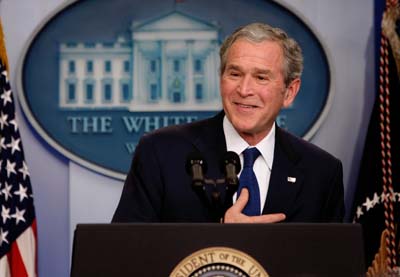BEN FELLER
WASHINGTON
President George W. Bush’s farewell speech is more than a goodbye to the nation that elected him twice. It is his last chance in office to define his tumultuous presidency in his own, unfiltered terms as he rides off to a quieter life.
In a goodbye address Thursday night, Bush will follow the script of Presidents Bill Clinton and Ronald Reagan and Jimmy Carter and many before them: Express thanks to the country and pride in the honor of serving, wish the next president well and outline what he considers to be the biggest challenges ahead.
Bush will talk about the nation’s response to the Sept. 11 terrorist attacks, the wars in Iraq and Afghanistan, the broader security threat to the nation and what he considers to be the high points of his domestic agenda. He will address a national TV audience for about 13 minutes.
“I’m going to urge our nation to continue to engage the world with confidence – confidence in the transformative power of freedom and liberty,” Bush said Thursday in previewing his speech in a final visit to the State Department.
For presidents, parting thoughts are not about parting shots. This farewell will be no different. But Bush is proud of his record and will go out defending it.
In that sense, the goodbye address will underscore the competing accounts of his presidency one last time.
Still, said presidential counselor Ed Gillespie: “This is less about policy. This is more, I think, about the people that he has seen and the experiences that we’ve had together. I think he wanted to express a little bit of his gratitude.”
Bush and his loyal backers see his record this way: He kept the country safe from attack after terrorism redefined his presidency, cut taxes, freed the people of Afghanistan and Iraq, reformed education, oversaw 52 straight months of job growth, acted decisively when the economy tanked, stuck to principle no matter what his poll numbers, retooled the military and improved federal crisis management after the worst U.S. natural disaster happened on his watch.
To his critics, Bush wasted the world’s goodwill after the Sept. 11 attacks, got the nation into a catastrophic and avoidable Iraq war, presided over a staggering 2.6 million jobs lost in 2008, ran up debt, reacted slowly to Hurricane Katrina, did more dividing than uniting and refused to listen to the will of the people.
Historians say the fairest assessment will come over time. Bush says accurate short-term history does not even exist.
Yet this much is also clear: The president does care about how the country views his time in office. Right now.
In essence, he has been giving legacy addresses for weeks. He has held separate events to defend his record on protecting the country, helping veterans, promoting volunteerism, appointing judges, expanding trade, reshaping the military, overhauling education and fighting AIDS in impoverished lands.
On its Web site, the White House has even gone so far as to post “100 things Americans may not know about the Bush administration record.”
The speech is expected to be Bush’s last public commentary as president.
He will deliver it from the East Room of the White House, where the audience will include a few dozen people chosen for their personal stories, a practice normally reserved for a State of the Union address.
Bush has been much more reflective in the twilight of his presidency. That tone will probably emerge in his speech, just as it did for his predecessors.
Clinton said in his farewell, “I’ll leave the presidency more idealistic, more full of hope than the day I arrived and more confident than ever that America’s best days lie ahead.”
Ronald Reagan invoked images of the shining city on the hill: “We made the city stronger. We made the city freer, and we left her in good hands. All in all, not bad, not bad at all.”
And Jimmy Carter told the nation, “From the bottom of my heart, I want to express to you the gratitude I feel.”
Not among that group? Bush’s father, President George H.W. Bush. He never gave an official farewell address.
Life after the White House will find Bush in two homes – his beloved ranch in Crawford, Texas, and the new home that first lady Laura Bush picked for them in an affluent Dallas neighborhood. He plans to write a book and run a new policy institute, but also will quickly get off the public stage.
“You just fade out,” Bush told reporters from Texas newspapers last week. “That’s fine with me. The faster the fade, the better.”










